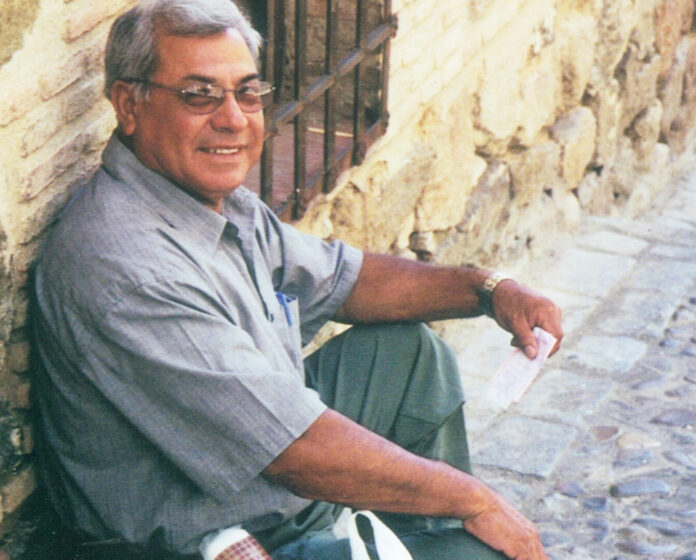HHS counselor and coach guided many Latino youth to careers of success
Celso Rosales was an original role model for Latino community members in Healdsburg, a true northern star. He arrived here from his native Mexico in 1957 as a Bracero Program farm worker and studied for several years to earn a teaching degree and serve as a counselor, sports coach, mentor and teacher at Healdsburg and Windsor high schools until his retirement in 2002. His life was celebrated last week at Healdsburg’s Oak Mound Cemetery, with graveside services delayed by the COVID-19 pandemic. Rosales died Dec. 31, 2020 at the age of 86 from complications of COVID-19.
A mass and celebration for Rosales was officiated by Rev. Sean Rogers on July 22 at St. John’s the Baptist Catholic Church in Healdsburg and a private family gathering was held the next day at Oak Mound with some of his Mexican relatives able to attend and lead the Rosary in Spanish.
Rosales became a naturalized U.S. citizen in 1965 and mentored generations of Latinos with English classes, citizenship tutoring, career counseling and community involvement.
“He both set an example and taught others that Mexicans could do more than just pick crops,” said his longtime HHS counseling colleague Herman Velasquez. “I can’t say enough about what he did for the Healdsburg schools and what he meant to the district. He did a lot but he didn’t always get credit for it.”
He was the first organizational leader of the United Latins of Sonoma County and founded the Latin American Club of Healdsburg that made many civic contributions to the community. He also served on the first board of directors of what is now the Alliance Medical Clinic. Further proof of his untiring pursuit for civic leadership, Rosales also was on the founding board of the Healdsburg Historical Society in 1976, the year of the United States centennial. With his second wife Darci, the couple led efforts at the museum to collect archives to preserve and celebrate the local Latino community and cultural contributions.
“Celso lived his life in several stages from his adventurous youth to his days as an educator and mentor,” said his wife Darci Citti Rosales. The two met while both were teaching at Healdsburg High School and married in 1991. “Celso always taught respect and to value your skills. He said use your skills to make yourself better, but also make your community better and make your friends better, too.”
Besides his counseling position at Healdsburg High School, Rosales also was a long-tenured tennis coach and served on the city of Healdsburg’s Parks and Recreation Commission. He taught summer school to the children of migrant farm workers and was the program coordinator from 1972-1976. He also was a longtime member of the Healdsburg Kiwanis Club.
Retired physician Dr. Dave Anderson remembers Rosales both for his many community contributions and his tennis skills on the court. “He would organize tournaments and invite us to play. Once, my wife Cathy was reluctant to play so he made her his partner and they won the tournament,” said Anderson. “I learned a long time ago one of the nicest things to say after someone passes that he was a ‘nice guy.’ Well, I can say Celso was a very good guy.” Rosales also was an excellent water skier and taught many friends the sport.
Rosales could be counted on to host regular get-togethers and barbecues, Velasquez said.
Rosales was born in Jerez, Mexico on Jan. 7, 1934 to parents Guadalupe Rosales and Elvira Saucedo, a farmer and a teacher. The young Rosales earned an associate of science degree from the Technological Institute of Durango, Mexico, before moving north to Sonoma County in 1957. He worked at the Frei Brothers Ranch in Dry Creek Valley and was a ranch foreman at Hocking’s Ranch in Geyserville before starting his teaching and counseling career.
Life for Latinos was very different from today when Rosales first arrived in Healdsburg almost 50 years ago. There were very few Latinos that worked outside of fieldwork in local vineyards and orchards. “Healdsburg was a ‘red neck’ place back then,” one of Rosales friends recently admitted. The labor force was very seasonal and dominated by migrant men from Mexico, mostly undocumented. Social life was segregated by skin color and language in those days, but Rosales and a few other more educated and aspiring Mexican nationals worked hard to get past those racial barriers and blazed trails for others to follow.
In 2012, the Healdsburg Historical Society and Museum held a large bilingual exhibit and event called “Ancestors of Mexico,” prominently featuring Rosales and his wife Darci who were serving on the museum board at the time.
Besides his wife, Rosales is survived by his daughters Elvia Rosales Vera (David), of Mexico; Angelina Rosales, of Windsor and Anita Rosales Moreno (Carlos), of Santa Rosa. He is also survived by eight grandchildren and six great grandchildren.









